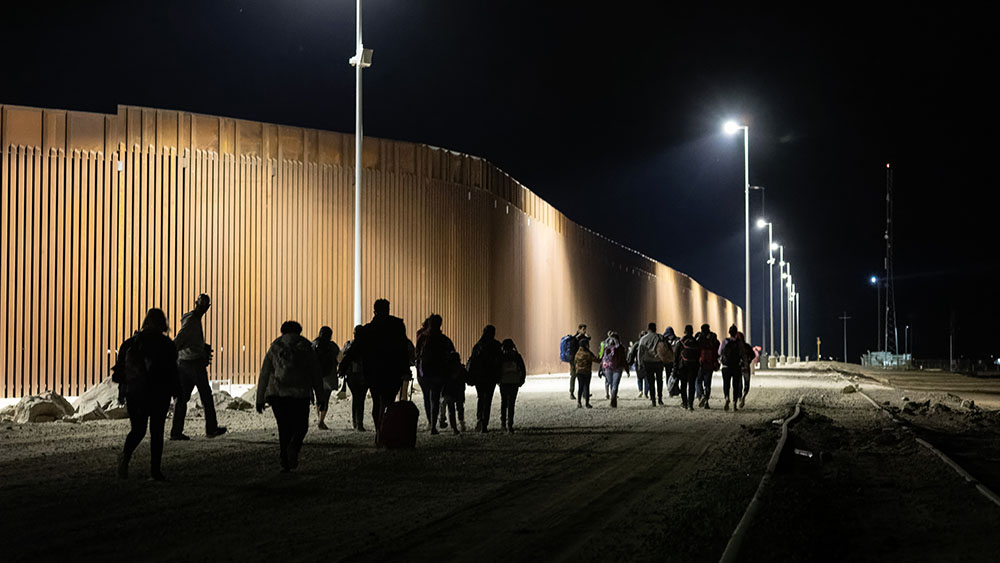Biden’s INVASION agenda wins: TREASONOUS judge suspends Texas law that allows cops to arrest illegal immigrants
03/06/2024 / By Belle Carter

The legal showdown between Texas and the Biden administration’s justice system continues as a federal judge recently blocked a new Texas law that gives Texas police broad powers to arrest migrants suspected of illegally entering the United States via the southern border.
U.S. District Judge David Ezra granted the preliminary injunction that halted a law that was set to take effect March 5. The ruling came as Biden and the Republican election frontrunner former President Donald Trump were visiting the said border to discuss immigration.
In the 114-page ruling released on Thursday, Feb. 28, Ezra rebuked Texas’ immigration enforcement and brushed off claims by Republicans about an ongoing “invasion” along the southern border due to record-high illegal crossings. Ezra cited the Constitution’s supremacy clause and U.S. Supreme Court decisions as factors that contributed to his ruling. He said the Texas law would conflict with federal immigration law, and the nation’s foreign relations and treaty obligations.
He added that allowing Texas to “permanently supersede federal directives” due to a so-called invasion would “amount to the nullification of federal law and authority, a notion that is antithetical to the Constitution and has been unequivocally rejected by federal courts since the Civil War.”
The law opponents have called the Texas measure the most dramatic attempt by a state to police immigration since a 2010 Arizona law that opponents rebuked as a “Show Me Your Papers” bill. Citing the Supreme Court’s decision on the Arizona law, Ezra also included that the law was preempted. He struck down state officials’ claims that large numbers of illegal border crossings constituted an invasion.
The judge also was skeptical as the state pleaded its case for what is known as Senate Bill (SB) 4 during an earlier hearing in February. He was somewhat sympathetic, he claimed, to the concerns expressed by Abbott and other state officials about the large number of illegal crossings. Ezra reasoned that he worried that the nation would turn into a confederation of states enforcing their own immigration laws. “That is the same thing the Civil War said you can’t do,” Ezra told the attorneys. Civil rights groups, who also sued the state, have argued the law could lead to civil rights violations and racial profiling.
The mentioned Texas legislation gives authority to state law enforcement to arrest people suspected of entering the country illegally. Border-crossers could agree to a Texas judge’s order to leave the country or face a misdemeanor charge for entering the country without proper documents. Migrants who don’t leave after being ordered to do so could be arrested again and charged with a more serious felony.
Republicans who back the law have said it would not target immigrants already living in the U.S. because of the two-year statute of limitations on the illegal entry charge and would be enforced only along the state’s border with Mexico. Abbott and other GOP governors believe that Biden is not doing enough to control the 1,950-mile (3,149-kilometer) southern border. “In his absence, Texas has the constitutional authority to secure our border through historic laws like SB 4,” Abbott said in a statement.
The Texas governor has implemented other measures to limit illegal border crossings including installing a floating barrier in the Rio Grande. This move has been likewise blocked by Ezra and is part of an ongoing legal battle. Abbott also placed razor wire along the state’s boundary with Mexico. State guard officers have then blocked U.S. Border Patrol agents from accessing a riverfront park in Eagle Pass. (Related: Texas showdown with the federal government continues as Gov. Abbott says state is “prepared” to handle potential Biden federalization of state national guard.)
SCOTUS sides with the federal justice system, temporarily halts Texas immigration law
Meanwhile, the U.S. Supreme Court on Monday temporarily halted the new Texas law after Gov. Gregg Abbott and his officials appealed Ezra’s decision.
Just hours later, SCOTUS released a decision and blocked the legislation from going into effect until next week. The Justice Department told the court that the law would profoundly alter “the status quo that has existed between the United States and the States in the context of immigration for almost 150 years.” The high court also requested a response from the state by Monday.
The federal appeals court previously granted a temporary stay of a lower court’s decision to block the enforcement of the “controversial” immigration law. “We will not back down in our fight to protect our state – and our nation – from President Biden’s border crisis,” said of the appeal. Over the weekend, the 5th U.S. Circuit Court of Appeals granted a stay of Ezra’s decision but put its ruling on hold for seven days, allowing time for the Biden administration to go to the Supreme Court.
White House spokesperson Angelo Fernandez Hernandez called SB 4 “harmful and unconstitutional” in a statement after Ezra’s decision last week. Texas, meanwhile, has argued that the law is not in conflict with federal law and that the state is “entitled to defend itself from an invasion.”
Head over to InvasionUSA.news for more stories related to the ongoing legal showdown between the state of Texas and the Biden administration on the migrant crisis.
Sources for this article include:
Submit a correction >>
Tagged Under:
anti-police, big government, border crisis, border policy, border security, Constitution, David Ezra, freedom, Greg Abbott, Illegal aliens, illegal immigration, invasion usa, Joe Biden, law enforcement, Liberty, Migrant Crisis, migrants, national security, Open Borders, scotus, Show Me Your Papers, southern border, suppressed, supremacy clause, Texas, treason, Trump
This article may contain statements that reflect the opinion of the author
RECENT NEWS & ARTICLES
COPYRIGHT © 2018 MIGRANTS.NEWS
All content posted on this site is protected under Free Speech. Migrants.news is not responsible for content written by contributing authors. The information on this site is provided for educational and entertainment purposes only. It is not intended as a substitute for professional advice of any kind. Migrants.news assumes no responsibility for the use or misuse of this material. All trademarks, registered trademarks and service marks mentioned on this site are the property of their respective owners.


















